#and their place within it & relations to others within it. So adult perspectives and things taught by adults and left unchanged are kind of
Explore tagged Tumblr posts
Text
I'd imagine it has something to do with the differences involved in learning in a peer-to-peer space vs subordinate-from-authority space, particularly in terms of what is transformed and what is left unchanged. Because of how thoroughly children are treated as subordinate by anyone who isn't around their age or younger, learning basically anything from anyone who isn't a child carries a particular weight to it that things learned from peers doesn't. It makes sense to make the distinction to me.
Also concepts of what is "appropriate for children" as seen by adults vs what is appropriate for children as seen by themselves vary widely - most adults will not teach a child to play Mercy or the arm burn games or anything, but a good handful of kids looooove playing torture games and will go out of their way to teach them to everyone around them. Likewise, when I was young, my friends and I loved to compete to jump off the highest structures, and my dad - who had done similar and was known for climbing buildings up to third- and fourth-story floors, which he would tell me and my siblings about occasionally - would work OVERTIME to discourage us from doing the same, because as far as he was concerned, we were too young to be doing that sort of thing, even though at my then-age he was, obviously, doing it just as much himself. And now that I am an adult... well, if I saw a seven-year-old climbing onto a roof and excitedly going "Guys, watch this, I'm going to jump off!" I'd be lining up to tel them to stop TOO! The childlore of "climbing onto tall structures and jumping off"-games would be filtered through a lens of appropriate behavior as seen by an adult and not reflect a child's perspective on the subject, if you follow me?
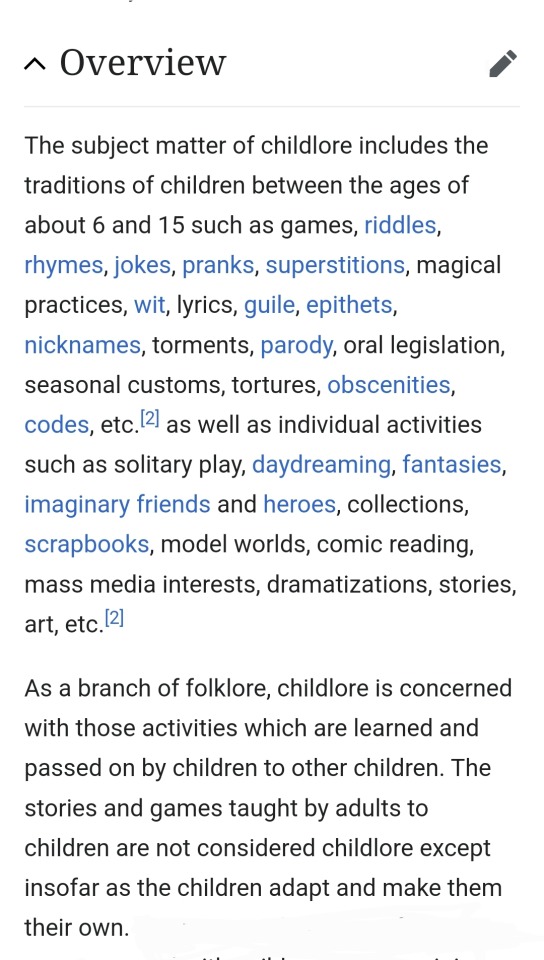
Haunted and excited by this being a field of study
#obviously not every kid has like a REVERENCE for things taught to them by significantly older kids and adults but not only do many of them#we also go out of our way to teach them that adults are Always Right and they must do things the way adults want them to Or Else#kids do obviously take and learn things and change them as they interpret them differently or feel it works better but there's a reason#people tend to say that kids are 'easy' and teens are 'hard' and that's because for the average person it's early teens when they begin#really testing limits and seeing what instructions they can safely change/ignore/defy and as kids they are more likely to take the word of#an adult as essentially gospel#in that sense 'adults passing on childlore' will hand 'down' games &etc that are going to be treated with a lot more relative significance#and seriousness than games invented or taught to them by peer children will be#like as far as i can tell childlore is particularly concerned with the viewpoint attitudes and beliefs of children as created and interpret#interpreted by children through mediums SUCH AS games songs rhymes etc... but it is largely ABOUT how children think and view the world#and their place within it & relations to others within it. So adult perspectives and things taught by adults and left unchanged are kind of#- not irrelevant (as noted by the post - things changed and interpreted outside the expected lens by children are counted) but not focal#sorry for the essay... i was reading anthropological papers all afternoon
67K notes
·
View notes
Text
I've seen some people making some very good points about Vander and his role as a parent to Powder and Vi, especially related to criticisms about how he wasn't as stellar of a parent as the narrative portrays, specifically that he was emotionally neglectful, parentified Vi and failed to connect with Powder. While I think these points are worth discussing, I'd like to offer my own perspective.
Disclaimer: I am not justifying any behavior in the context of a real-life relationship, only within the narrative presented
First off, I don't disagree. Vander doesn't appear to have made a tremendous effort to connect with Powder, and seems to be much closer to Vi and Claggor than her and Mylo, putting a significant amount of responsibility on them (especially Vi, as the oldest) and Vi is definitely far more responsible for her siblings than she should be at her age, with Vander barely supervising them.
However, I think there's a lot of context people like to ignore. First off, this takes place in Zaun. From everything that's implied about Zaun, people don't typically live into old age. If they survive the street violence, enforcer violence, and unsafe working conditions, they're still likely to die or become incapacitated early as a result of Gray poisoning/horrific pollution, as we see with Viktor. Vander worked in the mines, which would make him even worse off.
It's common for average parents, who had their children in their mid-twenties to mid-thirties, to live to see their kids well into middle age, when they will be reliably established as adults and able to care for themselves without guidance. This privilege does not extend to Zaunites. As someone with older parents at birth, I know the importance of older siblings in that situation. Vander needed to prepare Vi and Claggor to be responsible for their siblings and guide them into adulthood, because he knew that he was unlikely to be able to do it himself.
Second, one of the big ethical issues with parentification is that you chose to have kids, and should not subject your older children to the consequences of your choice. Vander... Vander didn't choose to have kids, they're not his biological children, he took them off the street because they had nowhere else to go. I think in real world adoption, the principle still applies, because adoption is also a choice and a lengthy, procedurally dense one at that, but that's not the case here. It really wasn't a choice for Vander, these kids had nowhere else to go. And this is a common theme in Zaun, there are just feral children everywhere, and people just take them in because it's the right thing to do. Everyone is responsible for everyone else. So, his kids needed to learn that same principle, to be responsible for each other, to look out when they are able for those who can't.
And lastly, as for his overall lack of supervision of his ankle-biters, I think... I think that's just a Zaun thing. I'm always so bamboozled when I hear people compare THIS aspect of his parenting negatively to Silco's, when Silco didn't supervise Jinx either. He let her hang out on a giant fan blade like 60 feet in the air and wander off to explode shit whenever she wanted. Benzo also doesn't appear to supervise his very young child, who doesn't even have any older siblings to watch him, and neither Jinx nor Sevika feel the need to keep one single eye on Isha as she runs around the underground doing as she pleases. It seems to just be a part of Zaunite culture, people lose their parents and their parental figures all the time, so they need to be able to look out for themselves.
All this to say there are definitely things worth criticizing about Vander's parenting, but I feel like people are being a little unfair about it.
#arcane#arcane spoilers#vander#vander arcane#silco arcane#silco#powder arcane#vi arcane#mylo and claggor#benzo arcane#ekko#jinx arcane
50 notes
·
View notes
Text
The Little Prince, The Rose, & The Aviator
AKA We just got confirmation that Oscar's main allusion is in fact The Little Prince so I wanted to gather all evidence that supports it in show thus far.
cross-posted from twitter
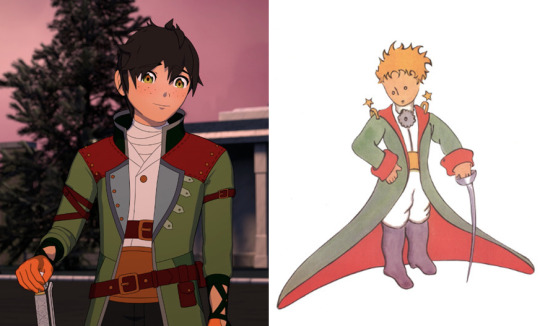
A brief summary for those who aren't familiar:
The Little Prince is a story about a young boy that travels to many worlds & meets many people. It is told out of chronological order from the perspective of an airplane pilot that the prince meets close to the end of his journey.
It explores themes around childhood and growing up, love, loss, friendship, loneliness, and hope, among other things. All ideas very prevalent in RWBY.
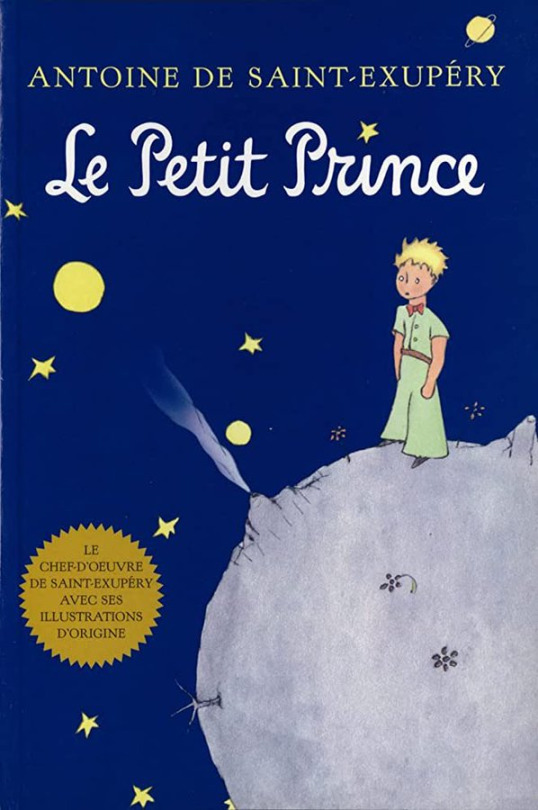
Part 1: The Little Prince
The first theme I want to touch on is that struggle of trying not to lose yourself as you grow up.
"Grown-ups never understand anything by themselves, and it is exhausting for children to have to provide explanations over and over again."
Oscar is the youngest of the group, and yet he is one of the characters most often shown trying to reason with the adults in the room.
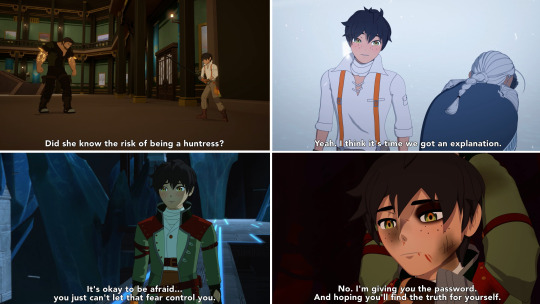
Yes, we've mainly seen it with Hazel, Ironwood, and Oz... but while the rest of RWBYJNR are also 'just kids', he spends so much energy trying to reason with them and mediate conflicts there as well. All while still being the youngest of the bunch.
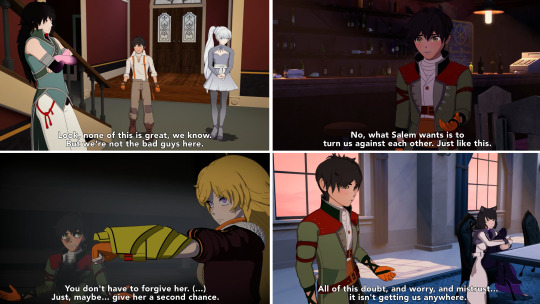
Another way this shows itself is in Oscar's resistance to merging with Oz. The merge is a very clear metaphor for how the people you meet and the things you experience can often change you. And how, when you're a kid, it all feels like its completely out of your control.

Speaking of the hoverbike scene, I want to shift to a different part of The Little Prince. The infamous moment with the fox and what it is to be 'tamed'. To be tamed is to create ties with others. To become important to them and for them to be important to you.

When Oscar is having a talk with Oz in v8 about how he finally felt like himself, the person he wanted to be, and felt like he was finally "part of the team"... There is a fox plushie lying on the ground as he passes by.

But we see that Oscar was right to feel this way later on.
Because just as he was "only a little boy like a hundred thousand other little boys" when he first met everyone... he had since been tamed, and tamed his friends in turn. And they fought tooth and nail to bring him back when he was captured by Salem.

Part 2: The Aviator & the Rose
In RWBY, most characters have a main allusion that is central to their arc and then secondary allusions for what roles they fill in relation to other characters. (Ex. Yang's main allusion is Goldilocks, but when thrown into the plot, she also becomes the Beauty to Blake's Beast, just as Blake was once the Beauty to Adam's Beast).
If we apply that metric to other characters here, we know that Ozpin's main allusion is The Wizard of Oz and Ruby is Little Red Riding Hood... so when placed within Oscar's story structure of The Little Prince, they become The Aviator and The (Ruby) Rose, respectively.

The aviator is a man that struggles to hold onto his childlike wonder. He tries, but he lives in a world of grown-ups so it becomes difficult with time. The little prince - much like Oscar with Ozpin - helps him remember some of the things that he's forgotten.
When the little prince meets him, the aviator is grumbly after crash landing his plane in the desert & is trying to fix it before he runs out of water.
Funny then, that when Oscar is crash landing a plane it is Oz that instructs him on how to do it.

When the aviator explains his circumstances, the prince laughs and exclaims that he "fell from the sky too". Which is an interesting tie in to the canon RWBY fairytale mentioned in Before the Fall, The Boy Who Fell From The Sky...

...as well as another fairytale we've seen mentioned in the show proper: The Girl Who Fell Through The World. A tale that was first talked about by Oscar, later expanded upon by Ozpin, and finally lived by Ruby Rose herself. (Yes her team also experienced it but it's very strongly emphasized Ruby and Alyx were paralleling each other in ways the others were not).
One thing about the little prince and the aviator is that by the end of their journey when it's time to say farewell, it's quite clear they've tamed each other as well. So much time spent by the pilot wishing to fix his plane and get out of the desert, but when it's finally time to say farewell, he does not want to go. This is not something we've gotten in show yet, but I'm willing to guess is going to be the basis for when the war is won and Oz is finally set free. Leaving the two of them to finally have to say goodbye.
And I realized I couldn't bear the thought of never hearing that laugh again. For me it was like a spring of resh water in the desert. "Little fellow, I want to hear you laugh again..."
Moving onto the Rose.
In the story, the little prince is enamored by her as soon as he sees her for the first time. As he gets to know her, she is described as many things. Some that fit Ruby well (miraculous, naïve) and some that she subverts (vain, self-centered).

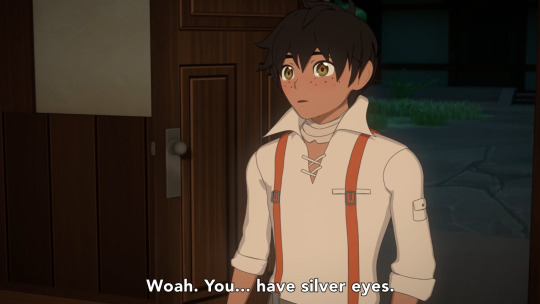
Ruby might not be caught up on physical appearance, but she is convinced that she's the only one in all the world that can do what she has to do. It's a childish way of looking at things, and to believe you can't accept help from others is - in its own way - selfish.

In the book, the rose asks the little prince to tend to her. She's very needy with her demands and while the prince loves her dearly, it is a strained relationship. In RWBY, Oscar sees Ruby wilting very early on and decides to tend to her without waiting for her to ask. Of which we have... SO MANY EXAMPLES AND I DON'T HAVE A HIGH ENOUGH IMAGE LIMIT TO POST THEM ALL SO YOU GET 2.
Not pictured here, but still worthy of note: Oscar mediating when Ruby is being undermined in v8, Oscar talking the responsibility of telling Ironwood the truth in V7, the "food always makes me feel better" / "I made you a casserole because you were sad" scenes. The List Goes On.

Part 3: Other Easter Eggs & Evidence
There are also other fun little pieces that drive home just how much these characters allude to the book as well as the inspiration it's had on the show in general.
The first thing the little prince asks the aviator for is a drawing of a sheep that he can take home with him so that it can eat up the sprouts of baobab trees before they overgrow his entire planet and destroy it (and his rose) in the process...

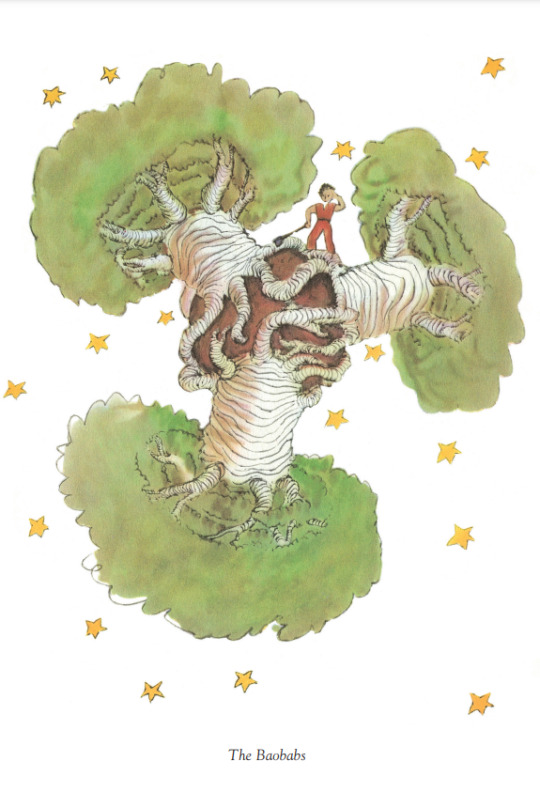
The tree in the Ever After has maple leaves, but the shape of its trunk is very clearly not a maple. When compared to these illustrations, it seems to have pulled inspiration from baobabs... and what does the tree in the Ever After do?
Its roots consume the rose.

One of the lessons that's brought up repeatedly in the book is that:
"One sees clearly only with the heart. Anything essential is invisible to the eyes.”
This is brought up in a few different ways:
The little prince left his rose back home, so when he looks to the night sky, separated from her, he says:
"The stars are beautiful because of a flower you don’t see . . ."
When Ruby is in the Ever After, with no one to tend to her, she is in a town filled with paper stars.

It is brought up again in reference to the desert, which we have a wonderful tie-in now thanks to the animatic shared at RTX recently:
“What makes the desert beautiful,” the little prince said, “is that it hides a well somewhere . . .”
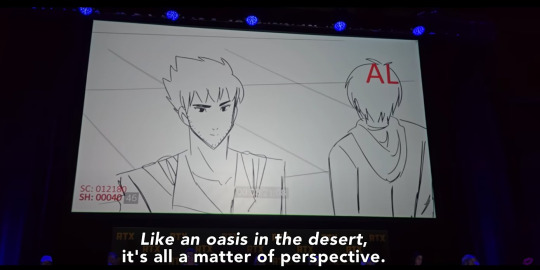
And again by the aviator in reference to the little prince himself.
What makes the little prince special is his loyalty to a flower. Ruby Rose, who inspired Oscar to keep fighting, who reminded him he was brave, and who's mission he has worn on his literal shoulders.


Two other lines in that passage I've highlighted I also want to mention.
"As the little prince was falling asleep, I picked him up in my arms, and started walking again. I was moved. It was as if I was carrying a fragile treasure."
This line about the little prince being a treasure (treasure is an rg song truthers rise up 🙌)
And the emphasis on lamps being symbolic of the Little Prince himself which... we've seen for Oscar A LOT.
"What moves me so deeply about this sleeping little prince is his loyalty to a flower - the image of a rose shining within him like the flame within a lamp, even when he's asleep... (...) Lamps must be protected: A gust of wind can blow them out..."

Also Ruby has been referred to as a "spark" by Oz before and when Oscar is worrying over Ruby at Brunswick farms, Maria tells him to "keep that fire fed" which is exactly what lamp lighters do. Just very deliberate use of that imagery here.
It ALSO ties into earlier in the novel where, among the little prince's many travels meeting plenty of confusing adults he doesn't understand, he encounters a lamplighter. And of all those that confused him, he found he could at least relate to this one and see value in his work.


There is also a matter of how the prince's first appearance is at sunrise:
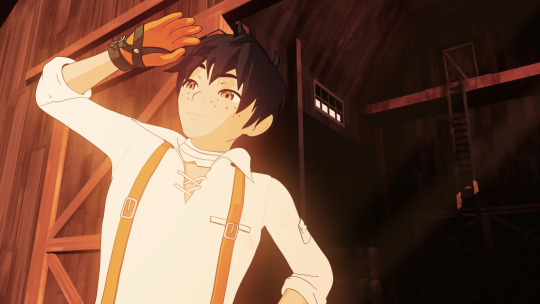
That he is cited to live on a planet "scarcely bigger than himself" and "being in need of a friend". How we see Oscar very alone on his farm back in Mistral, just like the prince, only tending to his daily chores by himself, we never even see his aunt.
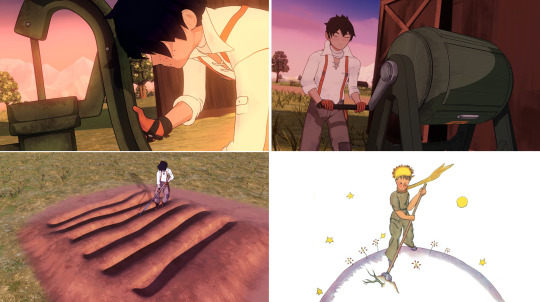
And while there are a few other bits and pieces i'm surely forgetting, the last big one I want to talk about is how both the beginning and end of the book start with a venomous snake.
The aviator shows us a drawing of a boa constrictor eating a wild beast...
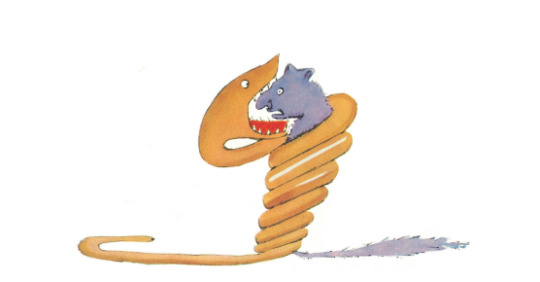
...versus Oscar's first appearance coming immediately after he wakes from a nightmare of Tyrian, a venomous scorpion faunus, being sent to capture his rose.
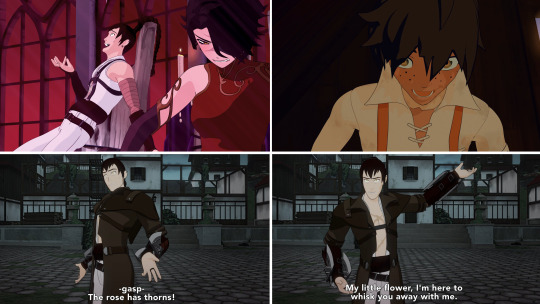
And the story ends with the little prince in a desert getting bit by a venomous snake that sends him back to his rose and away from the aviator... thank goodness RWBY loves to subvert its fairytale origins, amiright?

"(The little prince) fell gently the way a tree falls, there wasn't even a sound..."
tl;dr Oscar is for sure The Little Prince, Ruby has always been his rose, RG canon, Tryian vs. Oscar in the desert real and #GREENLIGHTVOLUME10 SO WE CAN SEE IT HAPPEN ALREADY >:OOOO
Thank you for reading 💕
#might to a lil red riding hood one next tbh#rwby#ruby rose#oscar pine#ozpin#analysis#rwby analysis#chainalysis#long post#the little prince#rosegarden#greenlightvolume10#meta#rwby meta
486 notes
·
View notes
Text
For the people that are going to do Dracula Daily this year:
One of the subplots that Dracula covers, and arguably the most important subplot, is one centered around a psychiatric patient confined to an asylum- it touches upon the way he sees the world, his relationship with his doctor, and how he relates to and perceives the villain VS the heroes, since for most of the plot he believes the villain to be good and strives to serve him.
Both the patient and the doctor characters (who are part of the main cast and very important to moving the plot foward in their own ways!) are portrayed as sympathetic victims to the main villain and mostly on the side of good, but in different ways, and, of course, the way they are written is informed by the beliefs of the time.
I won't spoil anything too important about it, just warn you that this subplot depicts Victorian Era ableism, which is... pretty extreme, and forms of medical abuse (specifically, psychiatric abuse) that still exist today!
This plotline involves:
-depictions of hallucinations, delusions, and irrational thinking
-medical malpractice: delusions being encouraged, patients being dehumanized, prolonged use of dangerous restraints
-unsanitary behavior (eating live animals)
-ableist attitudes from most of the hero characters
(other Dracula fans pls tell me if I've missed something)
What do I make of this? you ask. Well...
Do not excuse medical abuse, even if it's fictional. The doctor character is, for all his medical malpractice, depicted as a complex person that has some likeable traits and he undergoes a pretty sad arc relating to loss and trauma, like most of the heroes of this novel. This doesn't make him any less of an abuser, nor makes his patient any less of a victim!
Refrain from using ableist language or rethoric. The patient character, being written for a very old horror book, is often depicted as "unsettling" and his strange behavior is sometimes played for horror. This 1) doesn't make his situation any less deplorable 2) doesn't make him any less sympethetic and most importantly 3) doesnt give you a free pass to treat him as a scary horror monster. He's a victim of both the real monster of this story and the system he lives in.
Listen to psychotic fans. Research the history of Victorian asylums. Understand the historical context. Look at this subplot from a holistic perspective instead of treating it as a horror story within a horror story (although, it is a horror story, but not for the reasons some think it is!). Just don't be a dick to disabled people.
If any part of this subplot triggers or squicks you, you are not obligated to read it, just be aware that it exists and that it is important to avoid perpetuating ableist stereotypes, be they present in the original text or not. (Hell, you are not obligated to read any part of the book if you don't want to do so. Dracula Daily is supposed to be fun. Analyzing literature is supposed to be fun. Enjoying literature is supposed to be fun!)
For the love of God, don't get angry if some fans dislike the doctor character for what he's done and take the patients' side. This was an issue during the last Dracula Daily run. He's literally the victim in this relationship. I'm not saying you can't like or dislike either character but I have to reiterate: do not erase either character's contribution to the plot, do not demonize the patient character for being mentally ill in an "ugly" way and beliveing the villain is good, and don't woobiefy the doctor character because he said a funny thing once. Both are complex adult human beings so don't expect them to be caricatures.
Do not be afraid to call out ableist behavior from other fans, but also be careful to not overstep or talk over disabled fans, especially psychotic fans.
During the Dracula Daily run, some blogs will warn about the entries in which this subplot takes place, and what triggers apply for each one of them. If you need those warnings, don't be afraid to reach out for them!
Happy reading!
367 notes
·
View notes
Text
Moon - The Child, Saturn - The Parent
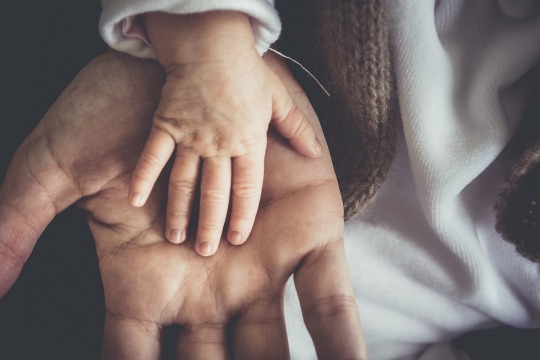
Moon and Saturn, despite being enemies, have one thing in common, and that is their cyclical, time oriented nature. Saturn is the responsible parent, who becomes dependent, childlike and weak in their old age, and Moon is the child, that grows into a responsible parent. As these two are basically the equivalent of "what was first - chicken or egg?" metaphor, these two astral bodies form a cycle of their own.
The maturity of Saturn is what we experience when we move away from our parents, and face the reality, that Moon doesn't like to face - the fact that our parents are also human, can't protect us from everything, and when we step into adult life, we're equalized with them. Saturn brings objectivity, rationality and perspective with growing up, and that perspective includes understanding, that a lot of the pain we went through growing up was circumstantial, and our parents did what they could to the best of their ability, and as we grow up we are prone to making mistakes if we don't check ourselves, just like they are.
The Moon has the opposite approach, because it's reactive, concerned only with survival, self protection in the moment and fulfillment of one's own needs. It doesn't possess any long term perspective, so it takes situations at face value from it's own biased point of view, and doesn't have the capacity to universalize. That trait of the Moon is necessary in order for one to survive in the physical world at all, just like a toddler learns that it need to cry and scream to signal its primal needs to its parents. Growing up, it also consists of a capacity to self soothe, navigate one's own internal landscape, ultimately achieve self understanding while being able to relate to and sympathize with others. A mature Moon is capable of empathy, and thus benefits from Saturn's objectivity.
The difference in perception between these two bodies is the scale of vision. The Moon only sees, perceives and feels what's in front of its face, it has a 0-1 scale of what feels good vs what doesn't feel good and it reacts based on that, with no conscience. Saturn has an infinite perspective of why something that didn't feel good to the Moon may have occurred. Saturn contains within itself an inherent judgment, that if we blame others for their actions, we need to put ourselves in their shoes. Saturn understands, that while we may blame our parents, we would make our own fair share mistakes with our own children if we had them and being a parent doesn't automatically make you perfect. The Moon is focused on reactively extracting immediate reactions from others. Saturn is focused on self improvement, substance and correction.
The irony is in how intertwined these planets are, despite their contradictory nature. Without the Moon, we wouldn't have Saturn. If we didn't know how we felt, we wouldn't know how to place boundaries, we wouldn't know what to change. Without Saturn, without boundaries and trials, we wouldn't know what our emotional needs are and what we need to provide ourselves as self-care.
As a result, the childish parts of ourselves in the Moon participate in our growing up process as much as Saturn does. A truly refined individual is someone capable of mastering both sides of these equation.
76 notes
·
View notes
Note
Hello,
As someone who’s recently delved into the anime community, I’ve noticed a profound connection many fans have with characters like Itachi and Sasuke. Their stories are undeniably tragic, and it’s clear they hold a special place in the hearts of many.
I’m curious about the depth of affection and empathy for these characters, considering they are fictional. What is it about their journeys that resonates so deeply with you? Is it not challenging to experience heartache over their struggles and sacrifices on a daily basis?
From my perspective, anime is a source of enjoyment and escapism. While I understand the impact of these characters, I wonder if focusing on their sorrow might overshadow the joy and adventure that new anime series can bring.
Itachi’s tale has concluded, and Sasuke’s safety is assured within the narrative. Wouldn’t exploring new stories potentially enrich our lives with diverse experiences and emotions?
I hope this question comes across as sincere and not dismissive of your feelings. I’m genuinely interested in understanding the emotional bonds fans create with these characters.
Thank you for sharing your thoughts.
Any piece of media that explores emotions and emotional bonds between characters is likely to click with a lot of people and leave profound impact on them. I'm not into anime or TV in general either, so I haven't seen many shows except for a handful few I can count on the fingers of my one hand.
To me, personally, while both Itachi and Sasuke are special because they're well written, there's also a kind of relatablity factor.
Sasuke grew up being compared to Itachi, no matter how hard he tried he didn't get the acknowledgement he deserved, because his brother was considered better than him. Maybe Itachi was better than him in skills and knowledge, but Sasuke was a different person with a different personality who shouldn't have been compared with Itachi at all. I've been through the same. Being compared with my classmates, friends repeatedly no matter how hard I worked. It just wasn't enough for some reason. It poisons you from inside and leaves you feeling insecure with a lot of sell-esteem issues. We know Sasuke went through them.
It's the same with Itachi. Kids experience different versions of parents. Older kids meet more immature and flawed versions of their moms and dads. The mistakes parents made with them aren't repeated with the second and third-borns. That doesn't mean it doesn't damage the older children who didn't ask to be born and bear the brunt of their parents' traumas. They're older so no they're expected to take the burdens and the responsibility. They kind of become mother and father to their younger siblings but more tender ones.
That's how Itachi and Sasuke's relationship before the massacre was as well as Itachi's relationship with his parents. I find this very relatable. The way he's not allowed to voice his opinions yet he cares about his brother. His ideals aren't really considered relevant, and his feelings don't matter to any adult in his life. That is so, so, so relatable to me. I learned a lot about my relationship with my parents when I watched and analyzed Itachi's with his parents. I learned to forgive my own parents after that. This is getting a little personal, but yeah, it happened. I don't feel as angry and bitter with them as I did before I watched Naruto last year.
Other than that, there are people who watched Naruto and also other anime, and they love these two along with the characters from other anime. I'm just not all that interested in it even though, yes, more stories would mean more entertainment. But I'm not someone who moves on easily from things and people.
Plus, I like the 'flavour' of angst some characters provide. It's hard to explain in the words, but it's like seeing colours. And it doesn't happen with every character I read about or watch. With Itachi, I 'see' red colour, and yes, it's the colour of his susano'o as well, but I'd had this feeling about him before it was introduced. It's like his aura that has some kind of purity to it. It doesn't have anything to do with his morals or how I perceive them, but something else. With Sasuke, it was bluish-purple. Again similar to his susano'o, but I'd had this 'vision' about his aura from the beginning. A character from a show in my country made me think of transparent snowflakes - pure and unblemished, and when his character was ruined, I started to see the 'muddied static' and I lost the connect with him. It never happened with Itachi or Sasuke. I love them both so much.
And I don't think I'm missing out on anything by not watching other anime. They might have other well-written characters that I might fall in love with too, but I love what Sasuke and Itachi make me feel. They're my comfort characters and they're therapeutic to me too, and they both feel very personal to me. Their pain made me feel less lonely. I don't really have friends irl (not the ones I can talk to when I feel alone), okay, this is getting even more personal but yeah so I spend my time either reading or writing. And it's also probably because if you've been depressed for too long, this kind of pain becomes addictive. So I need something to latch on to because I don't want to go to therapy.
This whole answer probably hasn't made any sense, because I don't know.. I tried my best, I swear.
#itachi#sasuke#uchiha brothers#ask#anon#again i tried to make some sense of this answer so i hope it makes some sense
24 notes
·
View notes
Text
Witches in Utena are extremely elusive figures, contrasted and scapegoated by the 'Prince'.
By context, all of the Black Rose Duelists (except for maybe Mikage*?) are witches, existing only in relation as the shadows of their princes. Of course, by the nature of duelists, they are also princes, though noticeably more pitiable and weaker than the student council. Ms. Himemiya, the notable witch herself, is at her most active, vindictive, and empathetic during this arc, helping push and break the other black rose duelists.
Kozue and Shiori are notable even within this array, having a strong presence in the first and third set of duels, and notable for having 'enchanted' their princes through manipulation, leading to an easy understanding of their 'witchiness' in the fandom and the audience. But having done so successfully, they become immortalized as their princes' princesses, who are unwilling to scapegoat the girls. Is this a victory? In the 3rd set of duels the pair return as Rose Brides, having established a solid foothold within the realm of women, either by maintaining an indispensable job (Kozue as Miki's adult counterpart, a bride), or by subsuming her entire character into getting a noble prince to take her (Shiori in her relationship with Ruka, a princess, loyal and bitter to the end).
The other notable witch in the cast is Nanami, Kiryuu Touga's younger sister, and known darling terror of the school. Her abrasive and cold-faced attitude easily places her as the antagonistic jealous counterpart to Himemiya, but this abrasiveness is shortly subsumed. Touga makes Nanami a duelist, and soon after abdicates his responsibilities, leaving Nanami as the Student Council President Pro Tempore for the rest of the series (or until Nanami's last duel - it is her decision, Touga never returns, and the Student Council is never disbanded). Until said last duel, Nanami joins Miki and Juri in the maintenance of the student council theater, theatrically musing on the stabbings and workings of the arena. It takes the events of "Her Tragedy" and "The Romance of the Dancing Girls" to shake her out of her cyclical anxieties, as the growing pains of adulthood snap the idling dreams of princes into perspective; Nanami is Touga's witch, his excuse, shadow, and scapegoat - the thing he uses to keep the other girls at bay, the thing that will never be respected or loved in its anger. The reprieve of a witches power, adult intimidation and sensuality, is only cold misunderstanding to her peers.
Himemiya is Akio's witch, the younger sister he uses to terrorize his fiancee and students, who is terrorized in turn by everyone else in the school.
In lieu of his now-implied-dead fiancee, Akio has no qualms turning Anthy and Utena against each other, functionally leaving them as each others witches. The victory of one is the disappearence of another, and so on.
Though disappearing is its own sort of victory, anyways.
*Mikage is technically Utena's shadow, being the negative chosen one, but due to the nature of princes, he maintains his position by 'Princessing' Utena/Tokiko/Mamiya and scapegoating the other researchers (the ghosts of Nemuro Memorial Hall). The closest Utena has to a proper black rose counter part are Anthy/Tatsuya/Wakaba, who face the emptiness of her idealism.
24 notes
·
View notes
Text
Hello @simonsapelsin! I’m ready to respond to the comment you left yesterday.
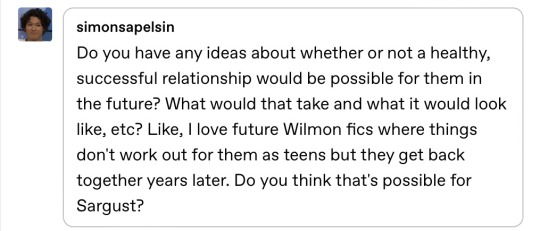
Within the parameters of canon—most likely no, but maybe? It would have to be backed up by a lot of plot and character developments in order for it to work.
This ended up being way too long, so more thoughts on sargust + thoughts on the potential created by AUs and canon divergences + thoughts on the idea of “healthy” relationships behind the cut…
So obviously season 2 ended in a really, really bad place for sargust. August refuses to embrace accountability and doubles down on his harmful behavior. Our last shot of Sara is her calling the police to report him, and in that moment she’s completely alone. They have that painful conversation about August buying Rousseau. That’s… that’s a lot for them to overcome, and season 3 doesn’t have enough episodes to get us there fully, unless the writing team are very, very clever and efficient.
There’s a popular fan interpretation of sargust that says that Sara and August both project identities onto one another and don’t see one another’s real selves. I understand and agree with that interpretation up to a point, but I don’t know if I necessarily agree with it 100%. In my mind they do see real things about one another (August sees Sara’s ambition and desire for independence, Sara sees August’s emotional vulnerability and need for help. And they do connect with one another in ways that others haven’t been able to connect with them. What August and Sara fail to predict about one another is the other’s choices. Sara assumed August would choose to be honest and August assumed Sara would choose to be queen. But I think the care they showed for one another earlier in the season was real, and the way they could hold space for one another was real. That’s really a meta I could write for another time, but a lot of it hinges on this line, which is not a line I am even remotely normal about:

(Note: I’ll probably write this meta eventually. The fact that these characters create a sort of home with one another! Also lol @ August looking like he is stoned out of his mind.)
So what would it look like for sargust to get a Second Chance Romance within the parameters of canon? I mean, first of all, they’d both have to mature independently for a while and work through a lot of the trauma they’re carrying.
For Sara, I want her to get away from home and have some distance from the place she grew up so she can put her childhood in perspective. Therapy would help. (I want that for Simon, too!) I’d also like to see Sara find some neurodivergent friends/community—I mean, we do tend to find one another and run in packs! And then some sort of career or life path that makes her happy. Maybe with horses, sure, but it’d also be interesting to see Sara keep horses as a beloved hobby while also finding a different career she’s passionate about.
For August, accountability and rehabilitation and understanding of the harm he did is incredibly important for his personal growth. Whether he faces that through the legal system or through some other process is something we have yet to see in the show. Then comes the long work of restitution and atonement, as well as the steps August needs to take to grapple with his various personal traumas. Like, please get this boy a place to process his grief over his father, treatment for his disordered eating, and rehab for his addiction to pills.
Now, Sara and August wouldn’t have to be 100% healed and self-actualized when they run across one another as adults—I don’t know if there’d be a story if they were, and this sort of stuff is lifelong work! But further along the paths above that I described—that could still be a good story.
Beyond growth and maturity, I think we’d have to see some sort of change in how August and Simon relate to one another, happening primarily on Simon’s terms because he was the one wronged, and that would need to be an important part of the story. This feels crucial. Now that Sara’s aware how much she hurt her brother, I don’t imagine she’d enter a relationship with August even if August is a super chill, okay person now. So I actually think a good Second Chance Romance story would have to heavily involve Simon in one way or another. But a fic where August and Simon interact more honestly with one another, and August has to face up to Simon’s personhood? That would definitely hold my attention. (I am kind of hoping they get more extended interaction in season 3, really. They have some sneaky but fascinating parallels as characters and I like watching the way Omar and Malte play off one another.)
Outside of canon… one thing I have considered is the potential to write a version of sargust in AUs that’s more tailored toward happy endings. Which doesn’t quite relate to your question but I do want to talk about it. As of now, AUs/Canon Divergence fics are a perfect place to make sargust actually work out. This fandom has a lot of imagination for AUs and canon divergences. And it’s no surprise—Young Royals is a rich, nuanced text that can be explored from many angles, so it only makes sense that we’d want to create a thousand alternate universe scenarios where canon could have gone differently. In my mind, if people can write “Erik lives” AUs, then “sargust is successful because August learns over time to be less shitty” AUs are also fair game.
The thing with writing an AU or canon divergence is that August’s complex brand of shittiness does not have to be inevitable or eternal. We’ve got creative freedom, baby! We can write any kind of arc for him that we want to and nudge him in all kinds of directions, and set him and Sara up for success! To me, part of the spirit of Young Royals is embracing the idea that everyone has choices, and that they are capable of growth that allows them to make better choices. I mean, sure, it’d be weird to find a version of August on page #1 of a fanfic who’s suddenly like, quoting bell hooks and pushing for an inclusive socialist utopia. I don’t know if I’d suspend my disbelief for that. But I also really struggle to suspend my disbelief for AU versions of August where he’s like… a straightforward flat villain solely out to cause trouble, which is something I have seen out there in the wild and clicked the “back” button over. I crave the nuance. The texture. The literary crunch of it all!
And I don’t think August has to be the center of a fic for that to happen, even. Like I think there’s ways to have him and Sara as a story’s Beta Couple or Gamma Couple and we’re rooting for them and you know what? It’s an AU where some of the characters are fae or 1980s punks or rival scholars of Cold War history so events are happening differently anyway. I’m sure there are ways to write August in character as his shitty self and have him eventually grow and change, without having August also ruin his chances with Sara because he does something that fucks Simon over so completely, you know?
Now, I know there’s fic writers out there who never under any circumstances want to write August’s character and can’t do so from a place of emotional safety. For some folks it is more comfortable to engage with him as a more straightforward villain. And that’s fair. Everyone should write what they feel comfortable writing! In this post, however, I’m thinking more about the people who want to include some kind of nuanced arc for August in their story, but also feel like no one will be interested in it, or like they’ll actually lose readers and engagement if they do write about him, even as a secondary character. Every once in a while I’ll see another fan allude to a really cool fic idea that involves August in some way or takes him in an interesting direction, and then they’ll be like, “oh, but why bother writing it, no one will read it anyway.” And… that makes me incredibly sad! Because I would happily read those fics. I know some other people who would happily read those fics! But I think we’ve normalized the idea that that’s just not how things are “done” in the Young Royals fandom. Which makes it very hard for people to take that risk. I think we’re missing out on some cool stories as a result, that could really be satisfying to read.
One final thought… I notice some fandoms use the word “healthy” when describing their OTPs/favorite pairings. I hope you’re okay with me unpacking that a bit? This is less a response to your comment in particular and more a response to fandom at large.
Honestly, “healthy” is a word that’s starting to feel pretty loaded for me, and can kind of rub me the wrong way. It seems that generally what people mean by it—when they apply it to a pairing—is that the pairing is good at communicating, respects one another’s boundaries, responds to one another’s needs, processes trauma, etc. And I do appreciate in a story when characters can do these things, to an extent.
But putting it under this umbrella label of “healthy” …well. Okay. “Healthy” is a word that society has added a moral dimension to, and it often gets weaponized against people with disabilities and mental illnesses and other chronic conditions. And health is not an indicator of personal worth. Holding people IRL to a standard of “healthy” kinda feels like you’re saying “it’s okay if you have these diagnoses, as long as you manage them in such a way that it seems like they don’t affect you or the people around you.” (And as someone who’s just recently begun managing a chronic condition, who’s struggling with how to tell my family members because of the way they’re going to moralize about my diet or my stress levels, and also struggling with the shit I’ve internalized over the years… well. I’m thinking about how we use the word “healthy” a lot.)
Bringing this back to the realm of fandoms (because, oof, TMI there blue!) holding a fictional character or pairing to the standard of “healthy” can kind of create some uncomfortable fandom dynamics—at least it can for me, personally. When I see fans take pride in the fact that they ship a “healthy” pairing, to the point where they frequently talk about how “healthy” their pairing is, it’s almost impossible for me not to read such comments as using a moralizing tone that implicitly puts others down for having “unhealthy” ships. Sometimes—generally I haven’t seen this as much in YR fandom—there are even people who will straight up write you off if they perceive your ship as “unhealthy” or “toxic.” And then suddenly all ships are either deemed healthy or unhealthy, and healthy ships are retroactively interpreted as doing everything right, while unhealthy ships can never do anything right, and there’s no hope for them. And that is… a bleak and boring landscape for shipping, if you ask me.
I want to read romances where writers are informed about how trauma can affect relationships and how one can learn to survive it, yes. But I feel iffy about the idea of a perfectly “healthy” romances for sargust or wilmon, seeing as they’re all characters with trauma and mental health struggles, and all of them have days that are Not So Good. They could all mature into adults who’ve learned from their past, but like, Wilhelm might still have panic attacks because anxiety is like that sometimes and it’s not a moral failing. August could go through rehab and be in a much better place and harm others less, and still might struggle with intense emotional disregulation or thoughts related to disordered eating, you know? I’d like reading trauma-informed stories where sargust can mature and heal. But they still might have bad days because that’s what being human is.
In addition, I also like tragic sargust where things just don’t work out between them and everything falls apart, because as I’ve said elsewhere on this blog, I’m a slut for tragedy.
So. Idk. I talk about all these things and all these possibilities in hopes that maybe someone in the fandom will get inspired by them. We’ll see if it does that! Ahaha. It’s worth a try.
ADDENDUM, since I didn’t talk about my own fic ideas here:
Heart and Homeland is an AU fic, and it’s tragic sargust for sure. And I’m proud of it, despite the part where their relationship is tragic! And I tried to work in little glimmers where you see how their relationship could have worked.
Now, my next fic idea, shared with @heliza24, is one set in a canon divergence universe where Sara goes to campus to look for Simon, on the night that Everything Is Fake But Wilhelm’s Love For Simon Is Real. As Sara walks around campus, trying to find her brother, she bumps into August, who is still high from the party and is just sort of… emotionally all over the place? In my head I think Sara and August actually trip over one another and he gets a skinned knee or something, so they have to break into some part of school late at night to get band-aids from a first aid kit, and they end up in a weird, late-night conversation and August actually ends up talking to Sara about his grief for Erik. Thus, he’s never at the window to film the video, and some weird door opens up in his brain about actually having someone he can open up to. He doesn’t change overnight, but his character—and everyone else’s characters—are butterfly effected in a totally different direction. That’s all I’m going to say for now! But gosh, I really hope I get the time and energy to write it.
#young royals#sara eriksson#august horn#sargust#this is a long post i am sorry#and also it veers into my thoughts about fandom stuff in general#but hopefully there are a few good ideas in there
43 notes
·
View notes
Note
About the post about Basils and daisies, while I agree that Basil and daisies are clearly repeatedly associated, there is a grave in the real world segments that has puzzle pieces left at it, which I personally assumed meant that the Headspace NPC Daisy was based on someone, but she died at some point during the four years Sunny was a shut-in.
So, I’ve actually seen this interpretation before, and while it’s interesting, there are some ways that it doesn’t really do much for me.
This hypothetical real world Daisy isn’t referenced in any other way than this grave with puzzle pieces on it. If I were to believe that there was an actual connection here, there would need to be something more solid than something that could be explained by just wanting to diversify the cemetery. Something like a reference in Angel’s house to a lost friend, or even an indication that the real Angel was ever interested in puzzles at all. From there, due to the lack of any kind of reference to another dead kid in Faraway, I would have to be convinced that the grave were not simply related to the fact that Angel seemingly has no adult guardian, being raised by his sister.
It is also important to note, no one outside of Sunny’s friend group gets to keep their name. Angel’s headspace name isn’t related to his at all! So it is unlikely that this other individual would have even been named Daisy in the first place, meaning that naming her that was a specific choice by Sunny’s mind.
On one level, I do believe that there is a real world inspiration for Daisy, because one exists for everyone else in the form of either a person or a plushie. However, I also believe that that person would most likely be Bebe, who is noted for having “a bad taste in men”, according to her sister, even if I went into some issues I have with that interpretation as well. Heck, the flower puzzle in Headspace is explicitly referred to as something that The Maverick’s counterpart threw away.
THAT ALL BEING SAID, it is important to look at things from a writing perspective. Daisy’s Dilemma is the only quest accessible while Basil is still in the party. But more than that, there are only four references to daisies in general within Sunny’s dreams, and I absolutely refuse to believe that only three of those references are related to Basil. Even if there is a deceased real world “Daisy”, I simply can’t imagine that that’s the only thing going on here. The second Omocat decided to associate daisies with Basil, she could’ve renamed Daisy to literally any other flower, but she didn’t, and that means something to me, even if the connection to the “single puzzle piece” in the omori route is a bit of a stretch.
Thank you for bringing this up though! It was something that I thought about mentioning when I made the original post, but elected against, as I personally believe the association between Basil and daisies is a much stronger connection than the puzzle pieces at the grave. But keep in mind, both can be true (and maybe that’s what you were getting at anyway, in which case oops sorry). Sunny’s mind could’ve represented an interaction he remembers from real life in Headspace and subconsciously added an additional association to Basil via the flower.
23 notes
·
View notes
Text
ISLAM 101: Creation: Part 2
Why did God Create the Universe?
When analyzing this issue, some facts must be kept in mind. While we perceive things from a human perspective, God does not. While we act out of necessity or desire, God does not. In other words, we cannot ascribe human attributes and motivations to God.
Who is distressed by the universe’s creation? Who does not desire to enjoy its benefits or seek happiness? Very few people express real sorrow at being in this world. Some have killed themselves, but their numbers are very small. The overwhelming majority of people are glad to be alive, to be here, and to be human. Who complains of being cared for by his or her parents, or of being nourished by that love during childhood? Who complains of being a young person, during which time the exhilaration of life is felt in the very bones? Which mature adult complains of having a family, children, and leading a harmonious life with them? How can we hope to measure the happiness of Muslims who, even as they are cultivating the seed for the next world, are ensuring success in this world? They are discovering the keys to the gates of ultimate happiness, and so are content and feel no distress.
The universe, which has been ornamented with every sort of art, is like an endless parade or exhibition designed to attract us and make us reflect. Its extraordinary diversity and magnificent adornment, the sheer abundance, and the flow of events present a certain reality to our senses and minds. This reality indicates the existence of an agent who brings it into being. Through the reality of His words and deeds, we come to know the Doer, and so His Names. Through these Names, we try to know His Attributes. Through the channels and prayers opened to our hearts, we strive to know Him in Himself. This raising up of our being is inspired across a wide domain of reality—things, events, the vast realm of humanity’s stewardship, as well as the relation or connection between us and the universe and the realm of God’s Names and Attributes.
But why did God create all of this? Consider the following: Great sculptors can produce, from the hardest stone or wood, life-like statues that express the most delicate feelings. But we cannot know these sculptors as sculptors unless their abilities are revealed. We can come to know or deduce their abilities from the statues or the process used to produce them. Every potentiality wishes to reveal the reality hidden within itself, to demonstrate what it knows by assuming an outward form. Seeds strive to sprout, sperms strive to join the egg in the womb, and floating bubbles strive to reach the ground like drops of water.
The urge to show our potentialities, and thus to be seen and known by others, is an expression of weakness or defect, as all beings and their wishes are merely shadows of the original essence. However, the Creator has no defect or weakness. Remember that no single or composite manifestation of the essence is similar to the actual essence.
All artistry in the universe informs us of God’s Names. Each Name, displayed by what has been created, illuminates our way and guides us to the knowledge of the Creator’s Attributes. They stimulate and awaken our hearts by His signs and messages carried to our senses.
The Creator wills to introduce Himself to us clearly and thoroughly. He wills to show His Splendor through the variety and beauty of creation; His Will and Might through the universe’s magnificent order and harmony; His Mercy, Compassion, and Grace through His bestowal of everything upon us, including our most secret wishes and desires. And He has many more Names and Attributes through which He wills to make Himself known.
In other words, He creates and places things in this world to manifest His Might and Will. By passing all things through the prism of the intellect and understanding of conscious beings, He arouses their wonder, admiration, and appreciation. Great artists manifest their talents through works of art; the Owner of the universe created it simply to manifest the Might and Omnipotence of His Creativity.
#Allah#god#islam#quran#muslim#revert#revert islam#convert#convert islam#converthelp#reverthelp#revert help#revert help team#help#islam help#salah#dua#prayer#pray#reminder#religion#mohammad#muslimah#hijab#new muslim#new revert#new convert#how to convert to islam#convert to islam#welcome to islam
2 notes
·
View notes
Text
📚 Tress of the Emerald Sea - Book Review
Goodreads Link: https://www.goodreads.com/review/show/5265296349
Rating: ⭐️⭐️⭐️⭐️⭐️
Genre: Adult fantasy, adventure, rescuing a loved one, fairytale vibe, ships and pirates, romance.

Tress of the Emerald Sea by Brandon Sanderson was a delight. The first of his four secret projects, set within the wider world of his Cosmere universe yet not necessarily connecting to any one series, follows the titular heroine Tress as she embarks on an adventure to save her friend Charlie.
First of all, the novel’s framing provided a unique and strong voice. Narrated by a familiar Cosmere character who also appears in the book, the book seamlessly weaves between the narrator’s strong voice and opinions, and the perspective of Tress herself. It feels as if we are being told a story in the best sort of way, which also emphasizes the fairytale-esque vibe of the plot and the characters. It also allows the reader to acquire fun facts about the world-building and it provides some nuanced mediations on the characters within the novel, without it feeling out of place, out of character, or interfering with the flow of the story.
Secondly (and most importantly), the characters and the plot were delightful. I absolutely loved Tress, who is an ordinary girl (and really feels like one) and yet decides to undertake a crazy plan for love - because it is the right thing to do, because someone should do something, and that someone is her. She has flaws the reader (and the narrator) notices from the beginning, and seeing her not only blossom and manage amazing feats but also grow out of her previous (and potentially harmful) mindset was very cathartic.
I loved her pragmatic and matter-of-fact manner, as well as her kindness, determination, and very real fears and doubts. The metaphors (especially the glove) as well as Tress’ love of cups were important through-lines that also tied in very nicely with the plot and the novel’s messages. The other characters were all great; real, fleshed out, often subverting expectations. I really appreciated the inclusiveness and diversity of several characters, who are allowed to exist and be complex without it feeling tokenistic.
The romance present in the story was so well-written, and truly provided a microcosm of the novel’s overall messages and themes.
The worldbuilding itself was definitely unique. The entire concept of the spores - how the moons and the seas worked, the different types of seas, how that affected our main character but the world itself as well - was detailed, vivid, and provided for some quite spectacular scenes. I also liked how the narrator slowly opened up the scope of the world, starting with Tress’ island and the basic concept of the spores, to the realities of sailing on the seas and the political and socio-economic relations.
It felt real, and was truly intrinsic to the story and the characters; as well, due to the narration, there was that otherwordly and ethereal quality to everything. I also find it fascinating that many concepts behind the worldbuilding was based on real science.
Finally, the illustrations (found in both the ebook version and the Dragonsteel hardcover edition) were absolutely gorgeous, and really brought key scenes (as well as the accompanying emotions) to life.
Tress of the Emerald Sea is a beautiful story; kind, full of adventure and character growth and amazing worldbuilding, and with a really great ending. It manages to subvert and critique a lot of tropes, but never in a way that feels mean or out of place. I loved it so much more than I thought I would, and I was already predisposed to like it already.
#mine#book reviews#books#tress of the emerald sea#brandon sanderson#the cosmere#secret project 1#fantasy#adventure#romance#pirates#ship#sea
26 notes
·
View notes
Note
I think far too many people analyse the content of MHA without considering the context.
That is not to say that there is no meaning beyond that, that it's immune to criticism or that it's simply not for anyone else - it is first and foremost a weekly shonen manga. Yes, I would say it has it unique edge in that it's a "battle shonen" that places a particular focus on sympathising with *all* characters - which are they the way they are? What does it mean to be a villain? Are people a product of their upbringing etc etc - but again, I think this is more than that.
This is a story for young adults+, a story about trying hard, accepting help, friendship, teamwork and becoming the best version of yourself within your means. I think that's important for kids and young adults to see these stories, to know they don't have to fight all of the time and know that they will have support even if they're disadvantaged in life. It's a story that shows changing perspectives and understanding. I think too many adults on the internet see media and automatically view it within their own limited worldview without remembering that they are stepping into something that was not necessarily created for them. This isn't a story that benefits from debating powerscaling (not that many do!) nor complaining about "talk no jutsu" - because it's not for them. You see the same reactions every time vocal westerners get involved in certain types of media. They just need to take a step back and think about why the media is presented in the way it is. Why their opinions differ. Just, they just need to be normal about it!!
Oh my gosh, yes!!!
Even as a Westerner, that's one of my peeves about what other Westerners do. They tend to forget that not everything is made for them and if they don't understand it, try to. Still can't? Don't be an ass about it.
Everything you just said about BNHA, it's how I feel. Now I know some asshat is gonna be like "You're giving Horikoshi too much credit, yadda yadda", happened before and that person is blocked.
But no. No one is saying Horikoshi has perfect writing. But who really does? I write and I say I have flaws. Yet, that doesn't mean that my writing isn't enjoyable to me and to other people.
That's what I feel towards BNHA, as with other stories. It's enjoyable, perfectionism be damned. I also don't know Horikoshi personally, so I don't know how his mind works. Sure, I get confused sometimes and I'll cringe. It happens.
But honestly? Whatever flaws I or someone feels about BNHA, it allows for exploration. It brings fics and art from fans. Criticism doesn't allow have to be a weapon.
Example! Not necessarily a "flaw" I guess, but I liked if Miruko got just as much spotlight and backstory as someone like Hawks. What did that do to me? It got me motivated to writing fics and making posts about her.
There's also the fact cultural differences play a part here, just as much as gender and age does.
I'm a black woman who has never been to Japan. So I know when watching BNHA, created by a Japanese man, I'm not gonna catch and understand some things.
That doesn't stop me from trying to understand so I can follow along. And it doesn't hurt to learn. I don't have to relate to it to understand.
6 notes
·
View notes
Note
Did you ever notice that the Turians are what the Krogans would be if they got their act together?
Kind of but not really.
Their cultures are structured entirely differently and not only because of the Krogan's sterlisation. But on a foundational level.
a BIG difference, and although this IS genophage related but not entirely, is their perspectives on sex (as in gender but in a biological way.)
Turians don't have "gender roles" in their society. All turians are equal in the Heirarchy. We mostly interact with males but mostly because Bioware didn't feel like designing and modeling female turians since that's extra work and blah blah blah 2000s gaming gender politics.
But anyway, focusing on in-game lore for now;
Turians don't have gender roles. All Turians are expected to have weapon and combat training which they learn from childhood and in young adulthood military service is required for a year or so (I forget the exact time the mandatory service is given. I'm busy replaying so I'd have to get to Garrus talking about his mandatory service. But Garrus also has his financial family history which fucked up his early adulthood so I THINK military service is mandatory for young adults but I could be misremembering and he served briefly when his scholarship fell apart and he was unable to go to whatever Turians have in the way of university/college).
All turians are equal as there is no "feminine roles" for women. Only the identification of skills. And although there is a difference in male and female psychology in turians, it gets neglected as all turians are placed along the same path. That being one of duty and honour to the Heirarchy. And this is specifically in being a warrior. There ARE turians whose personalities fall into other areas (such as science) but they are generally looked down upon socially if not officially.
KROGANS on the other hand have a very hard binary to their sexes, and not just because of the genophage. Eve tells you in ME3 that with the genophage, female krogans live completely seperate from the males purely out of species preservation, because they can't risk any females getting killed in male scuffles or er.... nastier and more desperate acts by males looking to sire a living child.
Eve says before the genophage fucked things up, females were treated as the "wisdom" of a clan. You had the clanleader who is male, but his jobe was focused on protection and survival in terms of aggression. Tuchanka is a hellworld, after all. But each clan would have appointed female "wise-woman" who essentially acted as the true leader of the clan, giving guidance and helping steer the clanleader in what decisions would be best for the CLAN in ways that aggression and conflict could not solve.
Clearly the women of the Krogan don't always get listened to and that's how they fucked up their planet. Either that or the focus on pushing women into the role of wisdoms of a clan came AFTER they blasted Tuchanka to shit as a precaution to prevent war of that scale to break out again.
So although they seem similar because they are both warrior races, their cultures work extremely differently, Turians operate as a unigender race, while krogans operate as a balanced gendered race.
There are other BIG cultural differences such as how the Heirarchy is structured versus the krogan clan structure but I'm less confident just remembering details off the top of my head. Mainly because I enjoy digging into and thinking about the different races as individuals within a social structure more than I remember their political structures.
Although it's also worth mentioning Turians are a unified race under one Heirarchy, while Krogans work on a clan structure. Of course this gets shaken up in the game itself (to avoid spoilers) but the difference also colours their cultures... Even if Turians still wear clan colours and instinctively distrust Turians who don't wear their clan colours ¯\_(ツ)_/¯
Also Krogans can swim and turians can't lol
17 notes
·
View notes
Note
So I read you piece about changing relationships and I had a question. Then I checked out you blog and you're an f1 fan so I thought, "that's a sign, go ahead and ask her".
My question, because I'm in a relaitiinship with someone who, I believe, is struggling to hold something together that doesn't deserve to be held. At what point has that space become too big. And if one half of it decided to do things that are, in my opinion, indefensible, illegal and downright disgusting, does you're theory disintegrate.
I'm the one standing in the space, I love her like no other but im not sure she has the capacity to carry the decision to break free from her anchor. Im looking for hope, im looking a way of understanding and im looking for the future I see for us.
Former jps lotus fan, current mclaren/lando but drifting to Oscar fan
I confess I wasn’t expecting a question directly related to the text. Don’t worry, though—there’s absolutely no problem in having asked it; it just caught me by surprise.
Before sharing my perspective on the matter, it’s important to highlight that my view might be completely different from yours. So, take into account only what makes sense for your reality.
When I talk about tolerance and persistence, I’m referring to the fact that we all possess both virtues and flaws—something that inevitably comes into play over time. In the early stages of any relationship, everything often feels perfect. As time passes, differences begin to surface, and eventually, you might find yourself confronting something you can’t tolerate. This raises an important question: if it was intolerable, why was it accepted in the first place?
Of course, this idea does not apply to cases involving physical or verbal violence or situations that are truly indefensible. In such cases, my theory falls apart—those circumstances demand immediate action, not reflection.
However, my reflection here addresses a different context: personality traits or actions that, while challenging, don’t fundamentally compromise your own values. In such cases, it’s worth stepping back to understand what those behaviors or traits might mean to the other person. Sometimes, individuals act from within a “bubble” of their own worldview—a perspective that holds deep personal significance, even if it’s difficult for others to grasp.
By exploring the importance of these issues to the other person, the next step becomes clear: you can offer support, but never impose. After all, as adults, we are responsible for our own decisions. If someone makes a choice solely based on what another person deems right, it can lead to resentment and strain in the relationship. They may feel a loss of autonomy in their decision-making process.
This brings me back to the central idea of my previous reflection: many times, we give up too easily when confronted with the mundane challenges of relationships. We underestimate, or even avoid, the value of routine, monotony, and repetition—elements that are intrinsic to any long-term partnership.
That said, it’s equally important to have clear boundaries. Each person must establish their own limits and hold them with conviction, knowing where compromise ends, and self-respect begins.
—
As for your thoughts on McLaren and Lando, I can see why you’re navigating this transition. Oscar really has the potential to be a future WDC, and his career trajectory is exciting to watch. But my heart remains with the Silver Arrows boys. 🤍
From the classic Formula 1 era, I’d definitely be a Williams fan.
0 notes
Text
Becoming Child Ready: Embracing Parenthood with the Montessori Way
Are we child ready…? This is a question parents-to-be are asking themselves today. While starting a family was the most natural thing to humans until some years ago, now we have a check list to qualify for being a parent. How necessary is this? The discrepancy in family transferred knowledge, lack of natural living space, the google god perspective, I want to know all about it mentality, you tube instant solutions, blog on anything and everything have led us to think we can handle everything instantly. But is it really so and what do we have in reality.
We are fine until we have this beautiful baby doll in hand enjoying their very presence but are we equipped for what is going to follow. If we commend ourselves to be child ready, all we have to do is ensure that by looking at the world through the eyes of a child and try to learn everything anew from the discovery perspective of the child.
Maria Montessori, the founder of the much acclaimed Montessori method that has its fair share of practitioners universally, rightly said, “Play is the work of a child”. Ho really!! – Most of us would wonder. When we relate the serious work of an adult to that of a child which is merely play, we discover that there is a need for more attention towards the child to observe the various changes that takes place much faster and minutely address the deviations and helplessness as and when it occurs.
An adult work always involves around self-respect or self-esteem, freedom to exhibit individuality, an advantageous familiar prepared environment, a clearly defined role, a leader for a role-model, clear communication, to err and learn, to research and analyze and much more to refine everything to perfection. A child’s self-respect on the other hand is intact and uncontaminated when born which we seldom realize and respect.
There is a parallel to self-respect of an employee to that of the child do we ever realise that and really think that a child has one. As with an employee, clear and respectful communication from the management or peers contributes a lot to the working harmony which brings in satisfactory progress to the organization so it is with a child when in its earlier ages the factors contributes a lot towards it growing with abundant human values that manifests in the development of the self as well as the others. Healthier communications leads to amicable relationships that helps in building a selfless environment within a social framework.
A safe prepared environment for a child to operate is to be provided by the parents for the child to have a holistic growth and in addition, more knowledge have to be acquired by the parents in the means ans ways of understanding and fulfilling the needs of the child.
Where do we seek to equip ourselves with the above?
It’s a blessing that Montessori philosophy incorporates all these values, looking at everything related to the growth of the child through methods and practices that preserves the freedom of the child and bringing the uniqueness of each child to the core without hindering their holistic development through pre-planned process of education focused on a structured curriculum that is always found wanting when providing a comprehensive knowledge of concepts and theories relating to any subject. Montessori is just not schooling, but a way of life for the child to prosper. To become a responsible and understanding parent, one has to be a part of the Montessori journey that can start with Pregnancy and go right upto the time when the child reaches 24 years of age, when the true adult stands magnified.
We do have to realise that our children are the only hope for a better tomorrow. It is time for the next gen parents to be child ready by equipping themselves with the profound knowledge of how to guide their children in their developmental growth in the most natural way without falling to the guiles and greeds of the modern day educational systems that has made learning a mere academic practice for clearing lopsided examinations worthless for a thinking individual who wants to establish himself as a unique person with the highest degree of respect and selfless thinking. As much as we prepare ourselves for a new job or for the next elevation of rank to excel in it, lets embrace parenthood so.
0 notes
Text
The Freedom Manifesto!
We are free to be expressive and do as we please! It is our right! Throughout the duration of this class, I have had the opportunity to learn through the arts and comment on items that I found appealing. After taking the time to review all my posts, I have concluded that I value the right to freedom and enjoy the arts that are very detailed, expressive, and meaningful. My manifesto is that freedom can be visualized around us whether we notice it or not. It sometimes gets taken for granted, and we express it freely through art. It opposes the idea that we are not allowed to do as we want and have limits. The arts mentioned throughout this writing demonstrate that we can reveal our true selves through freedom and be as expressive as we wish in our messages behind our art ideas. One piece of art that symbolizes freedom is the sculpture of Iwo Jima. This piece is a memorial tribute to the marines who have died in the line of duty to protect our rights as Americans. The piece shows explicitly a handful of marines placing the American flag on the top of Mount Suribachi after a battle and having received victory. The post where I took pictures of the sky was a message that we are free to spend the entire day, every day, doing things that we want and what makes up happy. From sun up to even throughout the night, we have all the time in the world to accomplish things because we have the freedom to do so. In addition, the songs related to the ocean that I posted show that we can enjoy the ocean by relaxing in the sand or water on a hot sunny day. It can provide us with relaxation and calm our mood. We can explore nature and our environment because we have the capability and allowance. The movie Moonlight focuses on a young child transitioning into a young man. Part of the movie focuses on his sexual identity. We have the right to sexuality and the right to privacy, which we can express as we choose. Along with Moonlight, the oil painting The Swing demonstrates this concept of having sexual desires with whomever they please. Although it may be ethically wrong to have a mistress, they are allowed to go through with it. To continue this subject, the poem For a Girl I Know about to Be a Woman expresses what a woman shall look for in a man and the things that are ominous. As adults, we have the right to do as we please and express ourselves to whomever we choose to. The other poem I wrote about at the beginning of my blog refers to being a teacher and being in school with children. The song talks about how we are a school of cultures; we all have traditions that we follow, and we can make the world a better place together, even though we have different values. Being a part of various cultures demonstrates that we have the capability and the right to practice any religion we want or no religion and that we are all equal no matter what we choose to believe in. A video I decided to put in my blog was the Re-enactment by Francis Alys and Rafael Ortega. In the film, a man receives a gun from a store associate and then carries it in his hand while walking down the town streets. Although he got caught and was detained, our laws and rules allow us to possess and carry weapons. The right to bear arms is one of the freedoms we are granted if we desire to use it. We can express ourselves however we choose and are free to do as we please. Freedom and expressiveness are demonstrated throughout the arts in my blog, and I have chosen this as my manifesto. I chose this because, as an American citizen, I am granted the right to do things, and the ideas correlate within my postings. My work in this class has allowed me to find a trend in the arts that I enjoy looking at and commenting on. It opened my eyes to the true meaning behind art mediums and how we can express our thoughts and feelings. My perspective has shifted on the importance of the arts and their meanings due to this.
0 notes